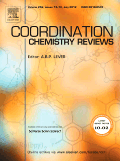
COORDINATION CHEMISTRY REVIEWS
Scope & Guideline
Pioneering Reviews for Tomorrow's Chemistry
Introduction
Aims and Scopes
- Coordination Complexes and Their Applications:
The journal extensively covers the synthesis, characterization, and applications of various coordination complexes, including their roles in catalysis, photochemistry, and biological systems. - Metal-Organic Frameworks (MOFs):
A significant focus is placed on MOFs, exploring their structural diversity, functionalization, and potential applications in gas storage, separation, and sensing. - Fluorescent Probes and Sensors:
The development and application of fluorescent probes for biological and environmental sensing are central themes, highlighting innovations in detection methods and their relevance in diagnostics. - Nanomaterials in Coordination Chemistry:
Research on nanostructured materials, including their synthesis and applications in catalysis and biomedical fields, is a prominent area, emphasizing the integration of nanotechnology with coordination chemistry. - Environmental Applications:
The journal also addresses the role of coordination chemistry in environmental remediation and sustainability, focusing on the design of materials for pollutant capture and degradation.
Trending and Emerging
- Sustainable and Green Chemistry:
There is a growing emphasis on sustainable practices within coordination chemistry, particularly in the development of eco-friendly synthesis methods and materials for environmental remediation. - Catalysis and Energy Conversion:
Research on coordination compounds designed for catalytic processes, especially those related to energy conversion, such as CO2 reduction and hydrogen production, is increasingly prevalent. - Bioinorganic Chemistry and Therapeutics:
The role of coordination chemistry in biomedical applications, including drug delivery systems and theranostics, is emerging as a prominent theme, highlighting the intersection of chemistry and health sciences. - Advanced Characterization Techniques:
The integration of advanced characterization methods, such as spectroscopy and computational modeling, in studying coordination compounds is on the rise, facilitating deeper insights into structure-function relationships. - Interdisciplinary Approaches:
There is a notable trend towards interdisciplinary research that combines coordination chemistry with fields like materials science, nanotechnology, and environmental science, fostering innovative applications and solutions.
Declining or Waning
- Traditional Coordination Chemistry:
There has been a noticeable decline in publications focusing solely on classical coordination chemistry concepts without a clear application or innovative approach, as the field has evolved to emphasize more interdisciplinary and applied research. - Inorganic Complexes without Functional Applications:
Research articles centered on purely theoretical aspects of inorganic coordination complexes, without a clear link to practical applications, have diminished, reflecting a trend towards more impactful studies. - Basic Transition Metal Complexes:
Studies focusing exclusively on basic transition metal complexes, particularly those lacking novel insights or applications, have seen a reduction in interest, as researchers seek more complex and functional systems.
Similar Journals

JOURNAL OF STRUCTURAL CHEMISTRY
Elevating Standards in Peer-Reviewed Chemical ResearchThe JOURNAL OF STRUCTURAL CHEMISTRY, published by PLEIADES PUBLISHING INC, is a premier resource in the fields of Inorganic Chemistry, Materials Chemistry, and Physical and Theoretical Chemistry. Established in 1960, this journal has been providing a platform for groundbreaking research, facilitating the advancement of knowledge and innovation up to the year 2024. With an ISSN of 0022-4766 and an E-ISSN of 1573-8779, this journal strives to maintain high academic standards, as evidenced by its quartile rankings in 2023, where it ranks Q4 across various chemistry categories. While it currently does not offer open access, the journal's insightful articles are crucial for professionals and students seeking to enhance their understanding and expertise in structural chemistry. Subscribers can expect a comprehensive collection of peer-reviewed research, empirical findings, and theoretical discussions that contribute significantly to the scientific community. With its strong historical foundation and ongoing commitment to quality, the JOURNAL OF STRUCTURAL CHEMISTRY continues to be an essential resource for those passionate about the complexities of structural chemistry.

Organics
Connecting Ideas, Inspiring Innovations in OrganicsOrganics is a peer-reviewed journal dedicated to the advancement of research in the field of organic chemistry, published by MDPI, a renowned leader in open access publication. Since its inception in 2020, the journal has embraced an open access model, ensuring that cutting-edge research is freely available to researchers, professionals, and students worldwide. With a current impact factor reflecting its relevance in the community, Organics aims to provide a platform for high-quality research, reviews, and insights that foster innovation and collaboration in the organic chemistry domain. The journal's scope encompasses a broad range of topics within organic chemistry, making it an essential resource for those involved in various research endeavors. As it converges from 2020 to 2024, Organics is set to build on its solid foundation and enhance its scholarly contributions by attracting significant research contributions that align with the latest scientific developments. Based in Basel, Switzerland, the journal's commitment to quality and accessibility resonates strongly with today's research landscape, making it a pivotal asset for anyone invested in the future of organic chemistry.
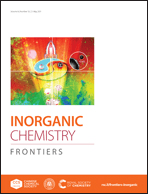
Inorganic Chemistry Frontiers
Elevating Inorganic Chemistry to New HeightsInorganic Chemistry Frontiers, published by the esteemed Royal Society of Chemistry, stands at the forefront of advancements in the field of inorganic chemistry, boasting a prestigious Q1 ranking in its category as of 2023 and an impressive Scopus Rank of #3 out of 79, placing it in the 96th percentile. Since its inception in 2014, this journal has provided a robust platform for high-quality research that spans the diverse and rapidly evolving areas of inorganic chemistry. As an open-access journal, it ensures that the findings presented are readily accessible to researchers, educators, and practitioners globally, fostering an inclusive environment for the dissemination of knowledge. With its rigorous peer-review process, Inorganic Chemistry Frontiers aims to facilitate interdisciplinary dialogue and innovation, making it an essential resource for anyone dedicated to exploring the myriad applications and theoretical advancements within inorganic chemistry.
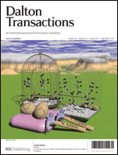
DALTON TRANSACTIONS
Catalyzing Collaboration in Chemical ResearchDALTON TRANSACTIONS, published by the esteemed Royal Society of Chemistry, is a premier journal in the field of Inorganic Chemistry, recognized for its significant contributions to advancing research and scholarship since its inception in 2002. With an impressive Impact Factor and ranked in the Q1 category, it holds a notable position at Rank #21 out of 79 within its Scopus category, highlighting its reputation for excellence and influence in the scientific community. This journal provides a platform for disseminating high-quality research, reviews, and communications related to all aspects of inorganic chemistry, fostering collaboration and innovation among researchers, professionals, and students alike. Although it does not offer open access, its robust selection process and commitment to scholarly integrity ensure that published works are of the highest standard. For those passionate about inorganic chemistry, DALTON TRANSACTIONS serves as an essential resource, fostering a deeper understanding of the field and its applications.
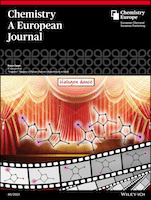
CHEMISTRY-A EUROPEAN JOURNAL
Leading the Charge in European Chemical ScienceCHEMISTRY-A EUROPEAN JOURNAL is a premier academic journal published by WILEY-V C H VERLAG GMBH, specializing in the diverse fields of chemistry and catalysis, with a distinguished focus on organic chemistry. Since its inception in 1995, the journal has established itself as an authoritative resource for researchers and professionals, currently classified in Q1 in Chemistry (miscellaneous) and Organic Chemistry, reflecting its high-quality contributions to the scientific community. With an impressive impact factor and robust Scopus rankings—#33 in Organic Chemistry and #26 in Catalysis—this journal serves as a vital platform for disseminating innovative research findings and critical advancements in chemical sciences. Although not an open-access journal, it provides valuable access options for institutions, ensuring wide reach and engagement within the scientific community. As it converges into 2024, CHEMISTRY-A EUROPEAN JOURNAL remains a key resource for anyone dedicated to advancing the frontiers of chemistry research.

RUSSIAN JOURNAL OF INORGANIC CHEMISTRY
Championing Excellence in Chemical ResearchThe Russian Journal of Inorganic Chemistry is a distinguished publication that delves into the fundamental and applied aspects of inorganic chemistry. Published by MAIK Nauka/Interperiodica/Springer, this journal has established itself as a vital resource for researchers, professionals, and students alike, contributing significantly to the fields of Inorganic Chemistry, Materials Science, and Physical and Theoretical Chemistry. With an ISSN of 0036-0236 and an E-ISSN of 1531-8613, the journal is indexed for easy access and citation. Though the journal currently operates under a subscription model, its commitment to disseminating high-quality research and fostering scientific discourse remains steadfast. The journal has been maintaining a consistent record since its inception, and its positioning in the Q3 quartile across various chemistry categories in 2023 underscores its relevance in the academic community. As it continues through its converged years from 1996 to 2024, the Russian Journal of Inorganic Chemistry plays a pivotal role in enhancing the understanding and advancement of inorganic chemistry, making it an indispensable tool for anyone engaged in this dynamic field.
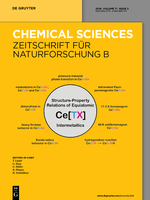
ZEITSCHRIFT FUR NATURFORSCHUNG SECTION B-A JOURNAL OF CHEMICAL SCIENCES
Advancing Chemical Knowledge Through Rigorous ResearchZEITSCHRIFT FUR NATURFORSCHUNG SECTION B-A JOURNAL OF CHEMICAL SCIENCES is a distinguished scholarly journal published by Walter de Gruyter GmbH, based in Berlin, Germany. Since its inception in 1947, this journal has served as a vital platform for the dissemination of innovative research and findings in the field of chemical sciences. With an ISSN of 0932-0776 and E-ISSN of 1865-7117, it is indexed in prominent databases, reinforcing its credibility and accessibility for researchers and professionals alike. Currently categorized in the third quartile (Q3) in the field of miscellaneous chemistry according to 2023 assessments, it holds a significant position in the landscape of chemical research, ranking 270th out of 408 in general chemistry with a percentile standing of 33%. Although not an Open Access publication, its rigorous peer-review process ensures the publication of high-quality articles that contribute to advancing knowledge and innovation in chemistry. The journal’s commitment to scientific excellence makes it an essential resource for students and professionals seeking to stay updated with the latest developments in chemical sciences.

CRYSTENGCOMM
Catalyzing collaboration in crystallization and materials science.CRYSTENGCOMM is a distinguished journal published by the Royal Society of Chemistry, dedicated to advancing the field of crystallization and crystal engineering. With its impact factor consistently among the top tier in its category, CRYSTENGCOMM serves as an essential platform for researchers, professionals, and students in Chemistry, Condensed Matter Physics, and Materials Science. The journal has successfully maintained its relevance and influence since its inception, showcasing pioneering research from 1999 to 2024, with a commendable Q2 ranking in the latest evaluations. This accessibility to crucial developments in crystallization facilitates knowledge transfer across disciplines and enhances collaboration within the scientific community. Although it operates under a subscription model, the journal remains committed to disseminating cutting-edge research and fostering innovation in the field. For more information or to submit your research, please visit the Royal Society of Chemistry's website.
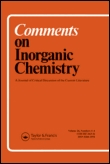
COMMENTS ON INORGANIC CHEMISTRY
Advancing the Frontiers of Inorganic ChemistryCOMMENTS ON INORGANIC CHEMISTRY is a prestigious academic journal published by Taylor & Francis Ltd, specializing in the dynamic field of inorganic chemistry. With an impressive impact factor placing it in the Q1 category, this journal ranks #6 out of 79 in its field, reflecting its high influence and contribution to the discipline, with a remarkable percentile ranking of 93rd. Since its inception in 1981 and spanning publications until 2024, this journal serves as a crucial platform for researchers, professionals, and students to disseminate groundbreaking findings, review articles, and discussions on contemporary topics in inorganic chemistry. Although it is not an Open Access journal, the rigorous peer-review process ensures the publication of high-quality research. By bridging theoretical and practical aspects of inorganic chemistry, COMMENTS ON INORGANIC CHEMISTRY remains an essential resource for advancing knowledge and fostering innovation within the scientific community.

TRANSITION METAL CHEMISTRY
Fostering Insights into Materials and MetalsTransition Metal Chemistry is a distinguished journal published by Springer, focusing on the latest advancements in the field of inorganic chemistry, materials science, and metals and alloys. With an impressive publication history dating back to 1975, this journal serves as an essential platform for researchers and professionals seeking to explore the complexities and innovations in transition metal chemistry. Transition Metal Chemistry holds a Q4 ranking in Inorganic Chemistry and positions itself in Q3 within both Materials Chemistry and Metals and Alloys categories, highlighting its evolving influence in these domains. With a Scopus ranking of #41 in Inorganic Chemistry and #56 in Materials Science, it provides readers with valuable insights into research trends and discoveries. Although it does not offer open access, its rigorous peer-review process ensures that only the most impactful and validated studies are published. By bridging theoretical concepts and practical applications, Transition Metal Chemistry plays a pivotal role in advancing scientific knowledge, attracting a diverse audience of researchers, students, and industry professionals committed to unraveling the complexities of transition metals.